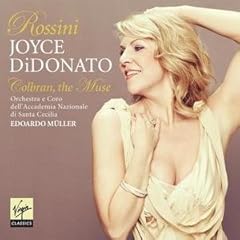“Irrepressible” DiDonato Is Rosina in Rossini’s Il Barbiere di Siviglia at Metropolitan Opera through November 7
 “A Brilliant Singer Hits the Heights with Rossini” (Time Out NY) – Joyce DiDonato’s Rossini Arias CD Is on EMI Virgin Classics
“A Brilliant Singer Hits the Heights with Rossini” (Time Out NY) – Joyce DiDonato’s Rossini Arias CD Is on EMI Virgin Classics
“The lustrous, vivacious mezzo-soprano Joyce DiDonato sings Rosina, and her fans will be eager to see her,” enthuses a New York Times listing for her recent return to the Metropolitan Opera as the spirited Rosina – her signature role. “Added to her lovely voice and precise coloratura were her superb dramatic skills: she spoke volumes with a sly smile or an arched eyebrow,” continues last week’s Times review, while Time Out New York’s review – the first – of her brand-new recording – Colbran, the Muse: Opera Arias by Rossini – opens:
“Here’s another bull’s-eye from the wondrous Joyce DiDonato, who’ll be thrilling Met audiences with Rossinian fireworks and lustrous tone in Il barbiere di Siviglia through November 7. On her new CD..., the brilliant Kansas mezzo has fashioned an eloquent tribute to Rossini’s wife and frequent inspiration, Isabella Colbran. ... If you’re new to the composer’s delights, DiDonato’s offering is the place to start: today’s gold standard.”
Joyce DiDonato’s Rossini singing has lit up stages around the world. Only last week, EMI/Virgin Classics released her highly-anticipated new Rossini arias CD, and it’s already on the Billboard chart. On this new album – the follow-up to last season’s Billboard-charting Furore: Handel Opera Arias – the renowned mezzo sings scenes from six operas Rossini composed for the Spanish soprano Isabella Colbran (1785-1845), the composer’s muse and wife.
“Hers is surely the best-ever recorded performance of ‘Tanti affetti,’ the virtuoso finale from La donna del lago, an opera she’ll tackle this season in Geneva and Paris,” says Time Out New York. The disc includes another scene from La donna del lago as well as arias from Rossini’s Armida, Maometto II, Otello, Semiramide, and Elisabetta, regina d’Inghilterra.
The mezzo sings the generous program of Colbran, the Muse with the chorus and orchestra of Rome’s Accademia di Santa Cecilia under the baton of veteran bel canto specialist Edoardo Müller. DiDonato’s famous rendition of “Una voce poco fa” from Il barbiere di Siviglia is not on the CD – but is available now from EMI/Virgin Classics as a special exclusive download on iTunes.
DiDonato sings Rossini at the Met
This fall, Joyce DiDonato returned to the Metropolitan Opera to reprise her inimitable portrayal of Rosina in Il barbiere di Siviglia. Her Rosina is already legendary, having been seen by millions in opera houses, high-definition transmissions, and broadcasts throughout the U.S. and around the world. Rosina’s signature aria “Una voce poco fa” has become a touchstone for DiDonato’s career. The New York Times described her 2007 performance at the annual Richard Tucker Gala as: “An ‘Una voce poco fa’ from Rossini’s Barbiere di Siviglia that was among the most spectacular vocal feats this listener has ever heard, thrown off with ease, a sense of fun and pinpoint control.” Joyce DiDonato’s much talked-about portrayal was captured and screened in an early Met: Live in HD transmission, with popular and frequent repeat screenings on TV and in theaters, and, more recently, free in the Lincoln Center Plaza (in front of the Met) in September. When she broke her leg during a June performance of Barbiere at London’s Covent Garden, DiDonato laudably carried off the evening with a cane – and finished the run of shows wearing a bright pink cast while navigating the set in a wheelchair, making the role of Rosina unequivocally hers. Late next spring, another Rossini opera, La donna del lago, provides the setting for DiDonato’s ninth role debut in six seasons, when she sings the role of Elena for the first time in Geneva (May 5, 2010); she reprises the part a few weeks later at the Paris Opéra with tenor Juan Diego Flórez (June 14, 2010).

Comments